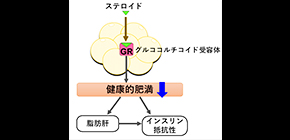
Adipocyte glucocorticoid receptors play a role in developing steroid diabetes
Osaka University researchers clarify part of mechanism behind the development of steroid diabetes
Steroids are used for treating various diseases such as allergic disorders, but they occasionally cause adverse effects, such as steroid diabetes and other metabolic disturbances. Since steroids act throughout the body, how these adverse effects are caused and by which organ are not well understood.
Researchers at Osaka University focused on glucocorticoid receptors (GRs), the receptors for the body’s endogenous steroids, clarifying part of the mechanism behind metabolic disturbances caused by steroids. The results of this research were published in Endocrinology .
The researchers administered steroids to adipocyte-specific GR knockout (AGRKO) mice and found that healthy adipose expansion was induced because lipid accumulation in the liver decreased and insulin sensitivity improved. Next, they examined how healthy adipose expansion was induced using AGRKO mice and found that adipocyte GRs inhibited lipid accumulation in adipose cells, preadipocyte proliferation, and glucose uptake, as well as lipolysis. That is, activation of adipocyte GRs restricted healthy adipose expansion, causing metabolic disturbances such as insulin resistance, liver steatosis, and eventually diabetes.
Corresponding author Yosuke Okuno says, “Our study elucidated how steroids activated adipocytes. Further development of the results of our study will clarify how steroids act on organs, leading to the development of drugs for treating steroid diabetes.”

Figure: Steroids act on adipocyte glucocorticoid receptors (GRs)
Activation of adipocyte GRs restricted healthy adipose expansion, causing insulin resistance, liver steatosis, and eventually diabetes.
(credit: Osaka University)
The article, “Adipocyte GR inhibits healthy adipose expansion through multiple mechanisms in Cushing’s syndrome” was published online and in print in Endocrinology at DOI: https://doi.org/10.1210/en.2018-01029 .
Related links
- Department of Metabolic Medicine, Graduate School of Medicine, Osaka University (link in Japanese)
- EurekAlert!
- AlphaGalileo
